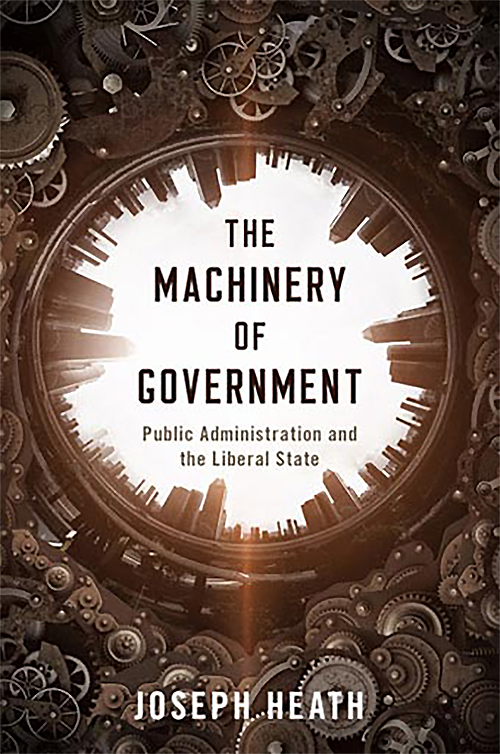This story was originally published on May 17, 2021 and updated on May 19, 2021: Congratulations Joseph Heath — the winner of the 2020 Donner Prize for his book, ‘The Machinery of Government: Public Administration and the Liberal State.’
We elect mayors, premiers and prime ministers to create laws and govern us. But who really has the power? Who really makes the decisions that affect our everyday lives?
Much of that power falls not to elected officials, but bureaucrats and public administrators, believes Joseph Heath.
Heath, a professor in the Faculty of Arts & Science’s Department of Philosophy and the Munk School of Global Affairs & Public Policy, examines just how much power rests in the hands of the public service in his new book of political philosophy, The Machinery of Government: Public Administration and the Liberal State.
“I think Canada is a country that works well, and quality public administration is a huge part of that success story. Unfortunately, it's a largely unacknowledged part of that story,” says Heath.
“If you look at the field of political philosophy, people spend about 75 per cent of their time talking about democracy and the legislature, maybe 20 per cent of their time talking about courts and the judiciary and practically no time at all talking about the executive branch of government or bureaucracy. Part of what I’m trying to do in the book is address this power.”

The Machinery of Government was shortlisted for the 2020 Donner Prize — an annual prize that recognizes the best public policy book of the year. The winner will be announced May 19. This is the second time Heath has been shortlisted for this prize, receiving the same distinction for his book, Enlightenment 2.0 in 2014.
“I was really pleased,” says Heath who was also awarded a Killam Research Fellowship from the Canada Council for the Arts last May. “The last time that I was nominated, it was for a popular book that had already had a certain amount of press and a wide readership. This time, it's for a scholarly book that might otherwise have languished in obscurity.”
If bureaucracy is so important for creating high-quality public policy and the delivery of public services, why is it largely ignored by political theorists?
“I think it's because political theorists regard their power as illegitimate,” says Heath. “In general, the view is that the only thing that can make state power legitimate is some kind of democratic decision. But for the average person, that's incredibly abstract. Once every four years you go and vote. And you don't really see the connection between the vote you cast and policies that get enacted.”
We assume those elected people pass laws, and then state officials simply act as a vehicle for establishing and enforcing those laws.
“But that's usually not the way it works,” says Heath.
A strong example of public administrators keeping us safe is the threat of radon gas. It’s certainly never been raised by any high-profile politician, yet it’s the second leading cause of lung cancer in Canada after smoking.
Radon is a radioactive gas that occurs naturally when the uranium in soil and rock breaks down. When it’s released naturally into the air, it’s of no concern. But in enclosed spaces like homes, it can accumulate to high levels and become a serious health risk.
Working with provincial and municipal governments, Health Canada has created a national radon gas strategy that keeps Canadian homes safe through a detailed system of regulations and guidelines for testing and building codes.
“It's actually really important for the health of Canadians,” says Heath. “The courts have nothing to do with it. Parliament has nothing to do with it. It's all been carried out by Health Canada. We should be grateful we have people who worry about things like this.”
Here in Toronto, one of the reasons it’s considered a world-class city is its planning department.
“Toronto has made incredibly smart planning decisions,” says Heath. Consider the many bicycle lanes that were created across U of T’s campus. Many were installed during the mayoralty of Rob Ford, but obviously they did not reflect the priorities of the mayor, this was the vision of the city’s planning department.
“So things like municipal planning departments are part of the underappreciated machinery of government that’s responsible for a lot of our quality of life,” says Heath.
In fact, just how it shapes our opinion of government cannot be overstated. “The quality of the bureaucracy and the civil service is the primary determinant of that,” says Heath.
“Most people's attitude towards the state is governed by the interaction they have with their child’s teacher at school, with the police officer who pulls them over for speeding, or with the person sitting behind the desk at the hospital. It’s these public officials — and the way in which they treat people —that have the most significant impact on people's perceptions of fairness in government.”
So while bureaucracy may be considered boring or unimportant to many, to Heath it’s endlessly fascinating and worthy of attention and discussion.
“I'm trying to show how bureaucracy should be acknowledged as a legitimate part of the way government works, as opposed to being an illegitimate kind of power that we tolerate. Not only does this power exist, it's responsible for a huge amount of the good stuff we take for granted.”

